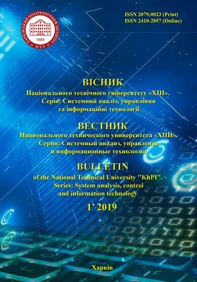PROBLEMS OF ELICITATION AND ANALYSIS OF REQUIREMENTS TO THE PROGRAM MODULE OF MONITORING ON THE BASIS OF THE CONDITIONS OF COGNITIVE ANALYSIS
DOI:
https://doi.org/10.20998/2079-0023.2019.01.05Keywords:
analysis, requirements, software module, dependency matrix, cognitive modeling, environmental monitoringAbstract
There are risks of obtaining result that does not answer a work purpose statement when developing the software product for new subject area. It is necessary to pay attention on requirements to the software for elimination of such risks. This article is considering questions about collection and analysis requirements to a program module of sea water areas environmental monitoring. Program system «НДС Эколог» for ensuring continuous observation of sea water areas condition is noted by complex structure, high labor intensity of processing, storage and manipulations of data due to their significant amount. The software of this system makes a large-scale program complex for monitoring researches automation. However, according to the preliminary analysis of functionality «НДС Эколог» on quality control of dolphins living environment is not sufficient and need additional module development. Thus, the further development of this monitoring system is associated with the problem of elicitation and analyzing the requirements for the program module for calculating the coastal zones water resources quality. Elicitation requirements to additional program module is carried out on the basis of the standard documentation analysis, business processes of monitoring researches according to program engineering provisions. Identified Requirements are need check on integrity and lack of contradictions in their pithiness for further documenting according to the international recommendations standard about development of requirements specifications to the software IEEE STD 830 1993. To solve the problems of information support and software for integrated monitoring, a matrix of requirements was formed and cognitive modeling was applied. The requirements dependency matrix represents a simple and effective method of contradictions and overlappings identification, in case of simple systems consideration. Cognitive modeling promotes better understanding a problem situation, identification of contradictions and qualitative system analysis. The purpose of modeling consists in formation and specification of a studied object functioning hypothesis which consists of separate subsystems and elements. In this case, the system of requirements should reflect the causal relationships of object elements under study.References
Gritsyuk I. Yu., Leshkevich I. F. Osoblyvosti vizualizatsiyi vymoha do prohramnoho zabezpechennya problem bezpeky ta yikh analizu [Features of defining requirements for software and problems of their analysis ]. Naukovyy visnyk NLTU Ukrayina "Lʹvivsʹka politekhnika" [Scientific bulletin of Ukraine NLTU "Lviv Polytechnic"]. 2017, no. 4, vol. 27, pp. 148–158.
Govoruschenko T.O. Teoretychni ta prykladni zasady informatsiynoyi tekhnolohiyi otsinyuvannya dostatnosti informatsiyi, shchodo yakosti u spetsyfikatsiyakh vymoh do prohramnoho zabezpechennya [Theoretical and Applied Fundamentals of Information Technology for Assessing the Sufficiency of Information, on Quality in the Specifications of Software Requirements]. Khmelnytsky, KHNU Publ., 2018. 421 p.
Grycyuk I. Y., Nemova O. A. Osoblyvosti formulyuvannya vymoh do prohramnoho zabezpechennya [Features of software requirements wording]. Naukovyy visnyk NLTU Ukrayina "Lʹvivsʹka politekhnika" [Scientific bulletin of Ukraine NLTU "Lviv Polytechnic"]. 2018, no. 7, vol. 28, pp. 135–148.
Duval Paul M. Nepreryvnaya integratsiya. Uluchsheniye kachestva programmnogo obespecheniya i snizheniye riska [Continuous integration. Improving software quality and reducing risk], uch. posobiye. Moskow, Vilyams Publ., 2017. 240 p.
Gaetzzi K., Mandrioli D., Jazaieri M. Osnovy inzhenerii programmnogo obespecheniya [Basics of software engineering]. St. Petersburg, BHV Publ., 2016. 832 p.
Bruks F. Mificheskiy cheloveko-mesyats ili kak sozdayutsya programmnyye sistemy [Mythical man-month or how software systems are created]. St. Petersburg, Symvol Plyus Publ., 2015. 304 p.
Burov Y. V., Pasichnyk V. V. Pobudova prohramnykh system z vykorystannyam ontolohichnykh modeley zadach [Construction of software systems using ontological models of tasks]. Systemnyy analiz ta informatsiyni tekhnolohiyi. Materialy dop. uchasn. XVI mizhnyar. nauk.-prakt. conf. [System Analysis and Information Technology. Proceedings of the XVI International Scientific and Practical Conference]. Kyiv, IPSA Publ., 2014, pp. 196–198.
Sigovets G. S., Semenov I. O. Razrabotka elektronnogo uchebnogo kursa s ispol'zovaniyem kognitivnoy karty kak modeli soderzhaniya [Development of an electronic training course using a cognitive map as a content mode]. Teoriya i praktika sistemnoy dinamiki. Materiali mezhdunar. nuch.-prakt. konf. Apatity, 12 nojab. 2011 [Theory and practice of system dynamics. Materials of the international scientific-practical conference, Apatity, 12 nov. 2011]. Apatity, 2012, pp. 97–106.
Semenov I. O., Sygovtsev G. S. Matematicheskoye modelirovaniye v planirovanii soderzhaniya elektronnogo uchebnogo kursa [Mathematical modeling in planning the content of the e-learning course]. Sovremennyye informatsionnyye tekhnologii i IT-obrazovaniye. Materiali mezhdunar. nuch.-prakt. konf. Petrozavodsk, 26 Feb. 2012 [Modern information technology and IT education. Proceedings of the international scientific-practical conference. Petrozavodsk, February 26, 2012]. Petrozavodsk, 2012, pp. 134–139.
Gorelova G. V. Slozhnyye sistemy. Kognitivnoye modelirovaniye [Complex systems. Cognitive modeling]. Kognitivnaya nauka v Moskve, novyye issledovaniya. Materialy mezhdunar. nuch.-prakt. konf Moskow, 13 Des. 2010 [Cognitive science in Moscow: new research. Proceedings of the international scientific-practical conference. Moscow, December 13, 2010]. Moskow, 2011, pp. 80–85.
Gorelova G. V. Kognitivnyy podkhod k imitatsionnomu modelirovaniyu slozhnykh system [Cognitive approach to the simulation of complex systems] Izvestiya YUFU. Tekhnicheskiye nauki [News SFU. Technical science]. 2013, no. 3, pp. 239–250.
Downloads
Published
How to Cite
Issue
Section
License
Copyright (c) 2019 Bulletin of the National Technical University "KhPI". Series: System analysis, control and information technologyAuthors who publish with this journal agree to the following terms:
- Authors retain copyright and grant the journal right of first publication with the work simultaneously licensed under a Creative Commons Attribution License that allows others to share the work with an acknowledgement of the work's authorship and initial publication in this journal.
- Authors are able to enter into separate, additional contractual arrangements for the non-exclusive distribution of the journal's published version of the work (e.g., post it to an institutional repository or publish it in a book), with an acknowledgement of its initial publication in this journal.
- Authors are permitted and encouraged to post their work online (e.g., in institutional repositories or on their website) prior to and during the submission process, as it can lead to productive exchanges, as well as earlier and greater citation of published work (See The Effect of Open Access).


